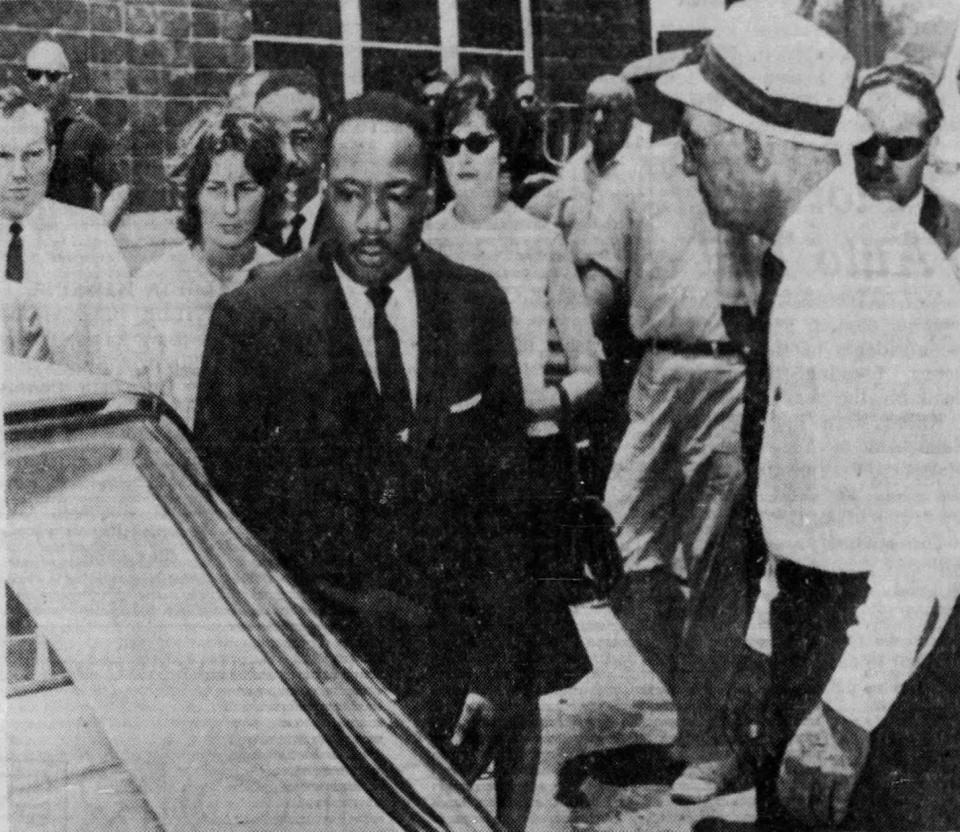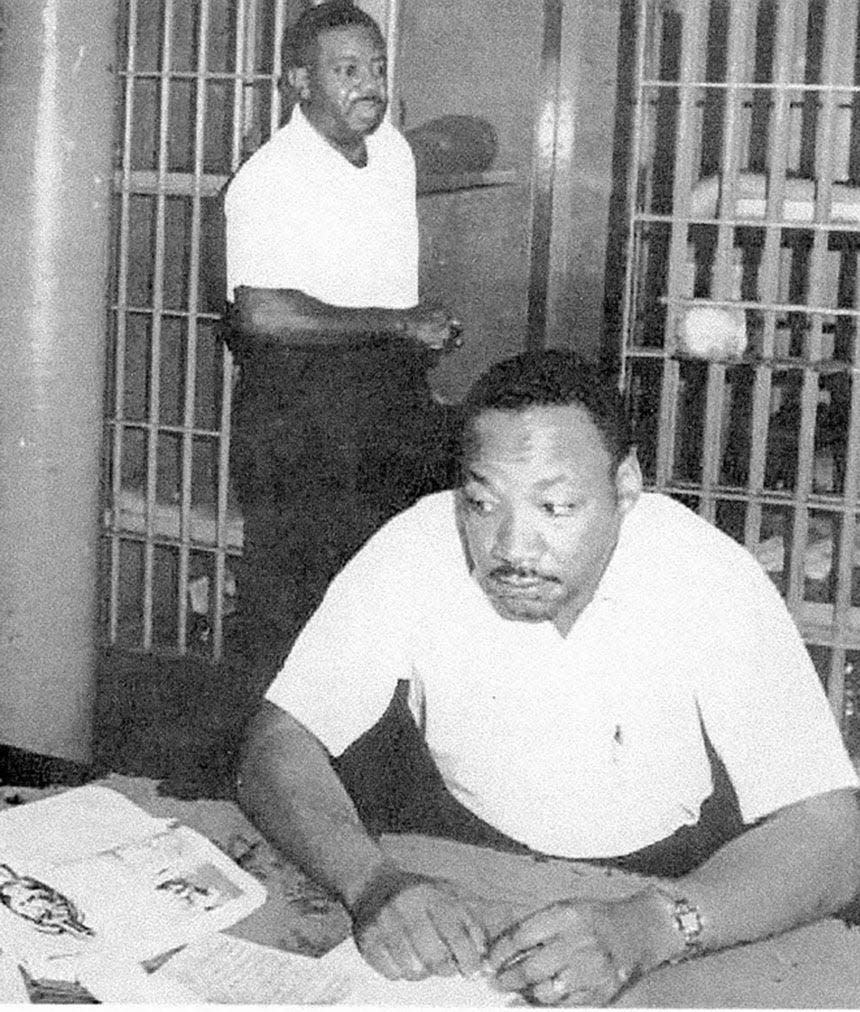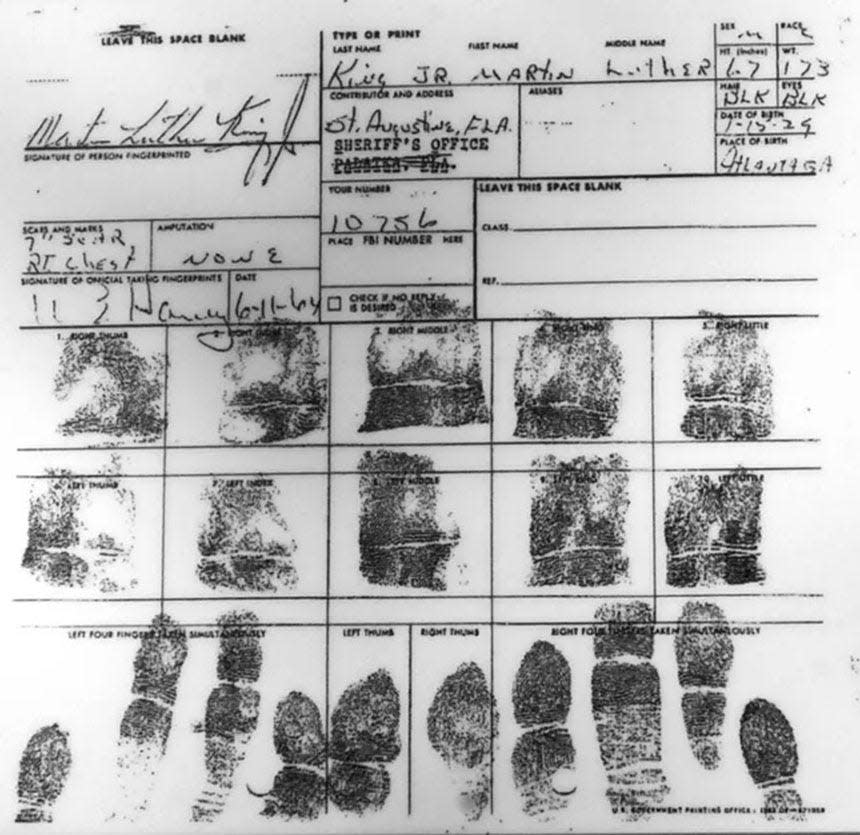This Week in St. Johns County History: King jailed in St. Augustine
- Oops!Something went wrong.Please try again later.
Editor's note: The Associated Press filed this report on June 11, 1964, the day the Rev. Dr. Martin Luther King Jr. was arrested in St. Augustine.
ST. AUGUSTINE —The Rev. Dr. Martin Luther King Jr. was jailed June 11, 1964, after he attempted to eat in one of St. Augustine's finer restaurants overlooking Matanzas Bay.
While Dr. King and 17 companions were held on charges of violating Florida's unwanted guest law, other civil rights demonstrators made another night march through crowds of jeering whites.
The whites threw firecrackers into the line of 200 marchers as they circled the old Slave Market. But there were so many helmeted officers — one for every marcher — that the cursing whites made no attempt to assault the demonstrators as they had done previously.

King's arrest: Civil Rights leader spent night in jail on trespassing charge
Photo gallery: A look back at 1964 in St. Augustine
After the march a crowd of white youths attempted to form a march of their own but were blocked by state troopers and police dogs.
At one point, the crowd broke through the line and darted toward the Black neighborhood where the marchers were reassembling in a church. But about 50 troopers and deputies ran in a body for two blocks and cut them off.
Shortly before the march, authorities found a cache of weapons including sulphuric acid, chains and clubs hidden beneath a wall along the parade route.
The city had taken two steps to reduce the danger. Workmen removed the bricks that boarded flower beds in the little park that adjoins the old slave market, and an electrician installed seven mercury vapor lights that will illuminate dark corners of the square.
Last night, white men and youths lurking in the shadows hurled bricks at state troopers who were trying to guard civil rights demonstrators from a cursing mob. The whites broke through the police line and slugged and kicked several demonstrators. Other marchers said they were burned by acid thrown from the crowd.
By day downtown St. Augustine is the picture of tranquility with old men playing checkers in the slave market and tourists viewing old Spanish buildings from horse drawn surreys. At night it is the scene of an outpouring of racial hatred and violence.
Dr. King was arrested on the doorstep of the Monson Motor Lodge Restaurant after a 20‐minute confrontation with the president and general manager of the concern, James Brock.
Everyone in town had known for 24 hours that Dr. King would be arrested. He had announced yesterday that he would go to jail to dramatize discrimination against Negroes in the nation's oldest city.
When Dr. King and his chief aide, the Rev. Ralph D. Abernaty, arrived shortly after noon, Mr. Brock was waiting.
The night before Mr. Brock, who also is president of the Florida Hotel and Motel Association, had been seen on a downtown street carrying a shotgun, a billy stick, a pistol and a flashlight. He was one of several businessmen in town who were made special deputies yesterday by Sheriff L. O. Davis The sheriff said he had appealed to the city's civic clubs to help maintain law and order.
Mr. Brock told Dr. King that he and his party of eight persons were not wanted, including a white Boston University chaplain, the Rev. William England. The two then began a polite debate of the civil rights issue.
Dr. King asked if Mr. Brock understood the “humiliation our people have to go through.” Mr. Brock replied he would integrate his business if the substantial white citizens of the community asked him to or if he were served with a Federal Court order.
“You realize it would be detrimental to my business to serve you here,” Mr. Brock said. “I have unfortunately had to arrest 84 persons here since Easter.”

Then he turned to the television cameras, smiled and said, “I would like to invite my many friends throughout the country to come to Monson's. We expect to remain segregated.”
As the cameras and reporters recorded the colloquy, a burly white man, impatient for his lunch, bulled his way through the crowd, violently shoved Dr. King aside and entered the restaurant.
Finally, Sheriff Davis and a deputy arrived and whisked Dr. King and his companions off to jail. Dr. King was expected to remain in jail for a few days while demonstrations continue.
There were indications that the authorities were beginning to crack down on the gangs of whites who have repeatedly set off violence in the town square without arrest or punishment.

State troopers, sent in yesterday by Gov. Farris Bryant, used tear gas to break up the mob that caused last night's outbreak. And for the first time white assailants were arrested.
Sheriff Davis said four St. Augustine youths were charged with disorderly conduct and resisting arrest and a fifth was charged with carrying a concealed weapon, a large chain.
In Tallahassee, Gov. Bryant said he had informed the White House law and order would be maintained without use of Federal troops or marshals. Dr. King earlier had asked President Johnson to send marshals because of an apparent breakdown of law enforcement locally.
“It is anticipated there will be more demonstrations,” Gov. Bryant said. “We cannot guarantee that someone won’t throw a rock. We cannot completely stop every overt act. To do that we’d have to line the sidewalks with police. But law and order can be and will be maintained.”
Before he went to jail, Dr. King observed that law enforcement had improved since state troopers reinforced the local authorities.
In Jacksonville, Federal District Judge Bryan Simpson said in a court order that there had been a deliberate attempt by law enforcement officers in St. Augustine to break the civil rights movement here by punishing those arrested. Judge Simpson ordered bonds for the defendants in sit‐in cases reduced and ordered Sheriff Davis to stop putting prisoners in an outdoor pen in the open sun and in padded cells.
“More than cruel and unusual punishment has been shown,” Judge Simpson said in his order. “Here is exposed in its raw ugliness, studied and cynical brutality deliberated and contrived to break men, physically and mentally.”
This article originally appeared on St. Augustine Record: This Week in St. Johns County History: King jailed in St. Augustine in 1964

